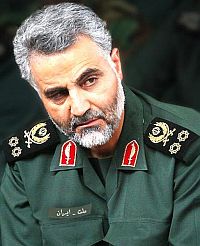The New York Times reports: Four years ago, Syria’s army had 250,000 soldiers; now, because of casualties and desertions, it has 125,000 regulars, alongside 125,000 pro-government militia members, including Iranian-trained Iraqis, Pakistanis and Afghan Hazaras, according to the senior American official in Washington.
And Syrians are not always in charge, especially where Hezbollah, the best trained and equipped of the foreign militias, is involved.
“Every area where there is Hezbollah, the command is in their hands,” said the Syrian with security connections. “You do something, you have to ask their permission.”
That, he said, rankled senior security officials who recalled the rule of Mr. Assad’s father, Hafez, in the 1980s, when Hezbollah’s patron Iran was the junior partner in the alliance with Syria.
American officials are exploring how to exploit resulting tensions between Syrian and Hezbollah commanders, said the senior American official.
An official in the region sympathetic to Hezbollah said that enemies were trying to exploit natural tensions that “happen between allies, and between brothers and sisters in the same house,” but would not succeed.
“Even if Hezbollah does battle alone, it is with Syrian approval,” said the official, who spoke on the condition of anonymity to discuss internal deliberations. “Hezbollah is only a stone that helps the builder.”
But others see a loss of Syrian sovereignty to Iran, which needs Syria as a conduit to arm Hezbollah. Charles Lister, a Syria expert at the Brookings Doha Center in Doha, Qatar, said Iran with the help of Hezbollah and other militias is building “a state within a state in Syria — an insurance policy to protect itself against any future Assad demise.”
Ali, 23, a soldier on leave in Damascus from the southern front, said one of his officers, a major, had complained that any Hezbollah fighter was “more important than a Syrian general.”
Then there is simple jealousy. Hezbollah fighters are paid in dollars, while Syrian soldiers get depreciating Syrian pounds. Hezbollah fighters get new black cars and meat with rice, Ali said, while Syrian soldiers make do with dented Russian trucks and stale bread.
A student who recently fled Damascus after being constantly stopped at checkpoints to prove he is not a deserter said that Hezbollah now runs his neighborhood in the old city and once helped him solve a problem between his brother and security forces. (Syrian police, he said, are so little seen that people now smoke hashish openly.)
“If you have Hezbollah wasta,” or connections, he said, “your problems will be solved.” The student identified himself only as Hamed Al Adem, a name he uses as a performance artist, to protect family members still in Damascus.
Even so, Hezbollah is not in a position to bail out Mr. Assad the way it did in 2013, when it sent hundreds of fighters to crush the insurgent hub of Qusayr, near the Lebanese border.
Hezbollah now has more fighters and advisers in Syria than ever, about 5,000, American intelligence officials said. But, said the Syrian with security connections, they “only interfere in areas that are in their own interests.”
The official sympathetic to Hezbollah said it has “maybe thousands” of fighters along the Lebanese border, hundreds in the south, bordering Israel, and only dozens around divided Aleppo, Syria’s largest city.
It had none in Idlib city, which he said may have fallen because some Syrian officers failed to correctly assess threats.
The Syrian with security ties said the leadership had not made a priority of defending Idlib. Many government troops, he said, fled after insurgents knocked out their communications network and called “God is Great” from the mosques.
“Damascus and the Syrian coast, other than this nothing is important. Nothing,” he said, adding of Mr. Assad: “He doesn’t give a damn if Syria is destroyed.” [Continue reading…]

